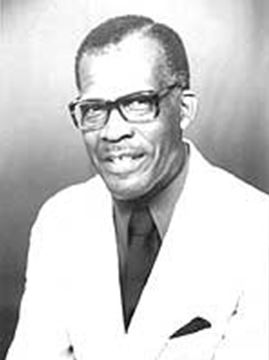
Rupert Godfrey John was born in the village of Evesham on 19th May 1916, the child of Donelly and Iona John.
He received his early education at the Evesham Methodist School and the St Vincent Grammar School where he excelled in the classics.
After a stint of teaching at the boys’ secondary school in St Kitts, he returned to serve as an undergraduate master at his alma mater, teaching English, Latin and History, while preparing himself for the successful pursuit of the BA degree as an overseas student of London University. At the Grammar School, he also took charge of the Scout Troup and the Debating Society - in both of which he had a keen interest.
Rupert John proceeded to England in 1949 to read Law at Gray’s Inn where he was called to the bar in 1952. On his return to St. Vincent he entered private law practice. In 1955, he helped to found the St.Vincent Labour Party and became the party’s first Deputy Leader. He also served for three years as a member of the Kingstown Town Board.
By the end of the nineteen fifties, Rupert John’s interest in local politics had waned, and he left for Grenada where he served as Magistrate of the Eastern District, followed by a stint as that country’s Attorney-General.
The mid-1960s saw Rupert John in the role of an international civil servant with the United Nations where he worked in a senior position in the Human Rights Division. One of the highlights of his UN career was his leadership of a high-powered UN Mission which attempted to mediate the civil war then devastating Nigeria.
On the approach to Statehood in 1969, Rupert John returned to St.Vincent as the country’s first native Governor, and received the accolade of knighthood in 1970. His normal duties apart, Sir Rupert involved himself in the Duke of Edinburgh Awards Scheme and founded the Childrens’ Welfare Fund to which he devoted a great deal of time and attention. He also used his leisure moments to put together a useful booklet on St. Vincent and its Constitution as well as two timely and instructive books entitled Pioneers in Nation Building and Racial Discrimination and its Elimination – both published under UN auspices.
Sir Rupert returned to private life in 1977, but was kept busy for several years as a much sought after lecturer and panellist on public affairs. Predeceased in 1989 by his wife, the former Hepsy Norris, Sir Rupert died on Christmas Day 1996. He was survived by three sons and one daughter.
 GOV.VC
GOV.VC